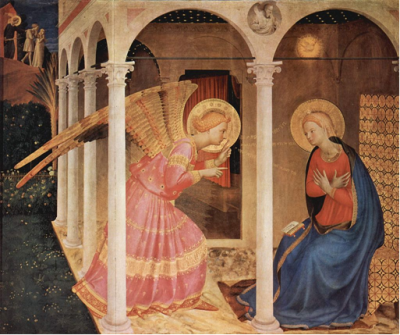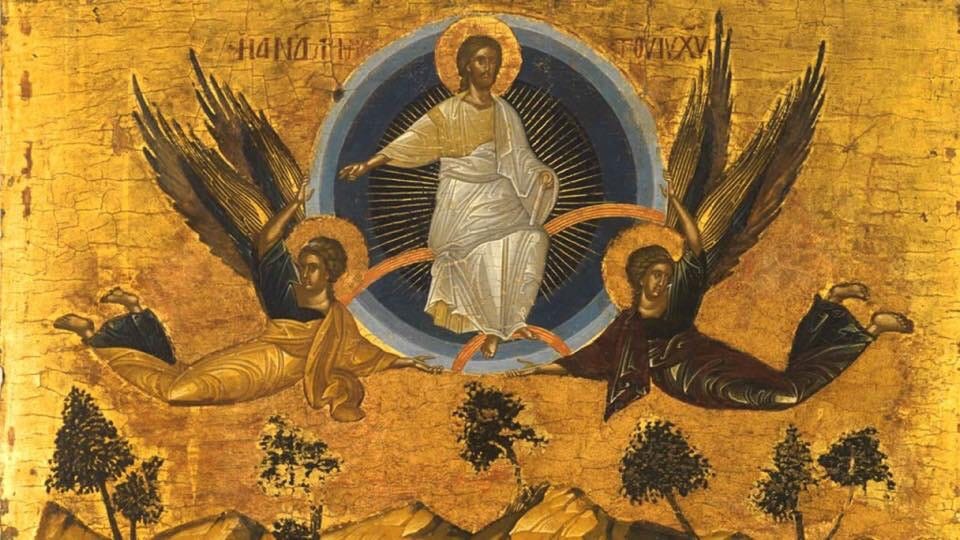The symbol plucks all the strings of the human spirit at once.1
—J.J. Bachofen
When you look with wonder on what happened to Mary, you must imitate her in the depths of your own souls. Whoever believes with all his heart and is ‘justified by faith’ (Rom. 5:1), he has conceived Christ in the womb; and ‘whenever with the mouth confession is made unto salvation’ (Rom. 10:10), that man has given birth to Christ.2
—Saint Augustine
In considering this parable, I was struck by the “holographic” quality inherent in Scripture. It seems especially pertinent to contemplate the “Parable of the Sower” during the Advent season, which traditionally begins today. When queried by his disciples, Jesus says just what the parable means. In fact, this is the only occasion that he deigns to interpret a parable for them. In his words:
18Hear ye therefore the parable of the sower. 19When any one heareth the word (λóγος) of the kingdom, and understandeth it not, then cometh the wicked one, and catcheth away that which was sown in his heart...
In the Gospel According to Mark, the writer is even more explicit (keep in mind that “word” is always logos):
13And he said unto them, Know ye not this parable? and how then will ye know all parables? 14The sower soweth the word. 15And these are they by the way side, where the word is sown; but when they have heard, Satan cometh immediately, and taketh away the word that was sown in their hearts. 16And these are they likewise which are sown on stony ground; who, when they have heard the word, immediately receive it with gladness; 17And have no root in themselves, and so endure but for a time: afterward, when affliction or persecution ariseth for the word's sake, immediately they are offended. 18And these are they which are sown among thorns; such as hear the word, 19And the cares of this world, and the deceitfulness of riches, and the lusts of other things entering in, choke the word, and it becometh unfruitful. 20And these are they which are sown on good ground; such as hear the word, and receive it, and bring forth fruit, some thirtyfold, some sixty, and some an hundred.
In other words, Jesus is talking about logos being “sown” in the hearts of his hearers. By Christian doctrine, Jesus himself is the Messiah, (מָשִׁיחַ, Mašíaḥ) meaning “one who is anointed,” which in Greek is Christ (χριστός), and which is taught to be (identical with) God, as an incarnation of the Logos (Λóγος) of Creation.
Imagine all Creation on the Earth in varying degrees of opacity to the sun, but one single point to be so thoroughly transparent to the light of the Sun that the Sun could—use your imagination—be said to be enthroned in its image there in all its fullness. The Sun could be seen as the father of its image in the point. It is then the job of us to liken ourselves to that point. But the point does not just retain the light in itself. Instead, it emanates, sharing its power, and works like leavening that strives to impart its nature to us. And yet can only receive it if we bear the proper vessel for it in us, just as the seed requires to be met with “good earth” before it can propagate its likeness.
You don’t have to couch this in Christian terminology to intimate what is being suggested. It’s extraordinary to find Plato having recourse to the same image. Consider the following exchange from the Phaedrus dialogue:
Yes, of course that is what I mean. And now may I be allowed to ask you a question: Would a husbandman, who is a man of sense, take the seeds, which he values and which he wishes to bear fruit, and in sober seriousness plant them during the heat of summer, in some garden of Adonis, that he may rejoice when he sees them in eight days appearing in beauty? at least he would do so, if at all, only for the sake of amusement and pastime. But when he is in earnest he sows in fitting soil, and practises husbandry, and is satisfied if in eight months the seeds which he has sown arrive at perfection?
Yes, Socrates, that will be his way when he is in earnest; he will do the other, as you say, only in play.
And can we suppose that he who knows the just and good and honourable has less understanding, than the husbandman, about his own seeds?
Certainly not.
Then he will not seriously incline to “write” his thoughts “in water” with pen and ink, sowing words (in Greek, the word is logoi, which is the plural form of logos) which can neither speak for themselves nor teach the truth adequately to others?
Returning to the significance of the seed, or the word in the “Parable of the Sower”: we can observe that that power, “by which all things were made,” is also present in us, as a seed present since the origin. How could it be otherwise? Where else would we expect to find this power other than in the beings and phenomena that it enthuses and animates? The question then again emerges: how we can provide fertile ground for to “bring forth fruit, some an hundredfold, some sixtyfold, some thirtyfold”?
The answer, of course, is found in the person of Mary, in whom the moral injunction of the “Parable of the Sower” was literally embodied. That is why the Advent season to me seems the perfect occasion to contemplate this parable in particular, together with the attention lent to the infancy narratives. “Mary kept these words,” the Evangelist tell us, “and pondered them in her heart.” In this case, the word rendered in English as “pondered” is συμβάλλουσα (symballousa), which is, literally, “symbolized.” As Jesus was born in Mary, so Christ is the Word being “sown” in the soul and the sameness of these two events is disclosed to the ones who are willing to receive these words and images and “ponder them in our hearts” in the example Mary set for us. Meister Eckhart explains, in his “Sermon №1”:
Here in time we make holiday because the eternal birth which God the Father bore and bears unceasingly in eternity is now born in time, in human nature. St Augustine says this birth is always happening. But if it happens not in me what does it profit me? What matters is that it shall happen in me.
Myth, Religion, & Mother Right by J.J. Bachofen
Augustine, Sermon 191, 4






Symbolos stems from the Greek sym- + ballein. Together, these elements mean something like "cast together," since ballein means "to cast" or "to throw." Compare, for instance, to the term "ballistic," or to the term "diabolic," or diabolos, which is, being interpreted, "to cast asunder." "Symbol" is on my mind in light of the beginning of Advent season today, particularly because of a line in the Gospel According to Luke, in which it is written, following the annunciation to the shepherds and their arrival to praise the newborn, that "Mary treasured up all these things, and pondered them in her heart" (2:19). The word rendered in English as "pondered" is συμβάλλουσα (symballousa), which is literally something like "symbolized," or, as per the etymology outlined above, "cast [them] together." Mary is understood to represent the "good earth" in the Parable of the Sower, in which seeds of knowledge can ripen into the fruits of wisdom and understanding. The "good earth" is, literally interpreted, the receptive soul in whom the Divine Word can incarnate.
I read a lot of articles online and elsewhere. I can often agree, but there is often a "but", a small addition that I miss, a one-sidedness. Here, in this article, I can agree 100% and feel deeply addressed. Thank you.
The Christ in me is born anew with every heartbeat and comes into our "blood" and tries to stay alive and grow within us. With sufficient self-knowledge, we know how little this happens.
Ottmar